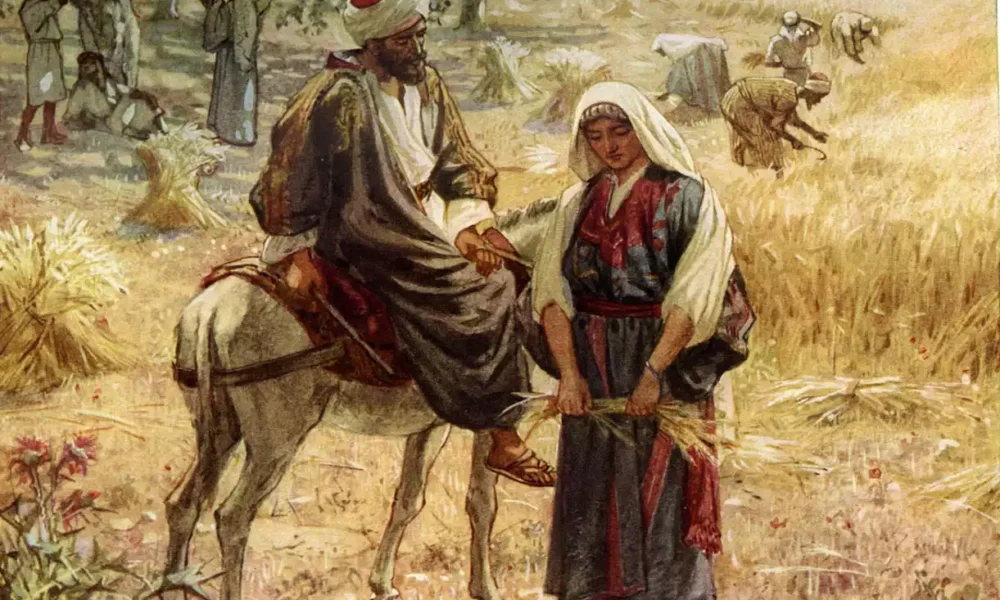Table of Contents
Introduction
The Book of Ruth is one of the shortest books in the Bible, yet it holds a profound message of loyalty, faith, and redemption.
Set in the time of the Judges, it tells the story of Ruth, a Moabite woman who, after the death of her husband, chooses to stay with her Israelite mother-in-law, Naomi.
Through her devotion and hard work, Ruth’s journey unfolds, leading to a remarkable transformation and the unfolding of God’s plan for her life.
This Book of Ruth Summary beautifully illustrates themes of kindness, divine providence, and the power of faith, making it a timeless narrative of hope and restoration.
Who Wrote the Book of Ruth?
The Book of Ruth is one of the books of the Hebrew Bible and is part of the Christian Old Testament. It is named after its central character, Ruth, and is a short narrative that tells the story of her loyalty to her mother-in-law, Naomi, and her eventual marriage to Boaz, which leads to her becoming the great-grandmother of King David.
The author is traditionally unknown regarding Book of Ruth. However, there are several theories:
- Samuel as the Author:
A common Jewish tradition holds that the prophet Samuel may have written the Book of Ruth, especially since it is placed in the section of the Hebrew Bible called the “Former Prophets” and is set in the time of the Judges, which overlaps with Samuel’s lifetime.
Samuel is considered a central figure during the time the book was set, so some scholars suggest he may have written it as a historical record.
- Post-Exilic Writing:
Some scholars suggest that the Book of Ruth was written or edited during or after the Babylonian Exile (around the 5th century BCE).
This theory is based on the book’s themes of inclusivity, foreignness, and divine providence, which may have resonated with the post-exilic Jewish community.
It could have been written to encourage the returnees and offer hope for the continuation of God’s promises to Israel, especially through the line of David.
- Anonymous Authorship:
The most widely accepted scholarly position is that the Book of Ruth was written by an anonymous author or compiler.
The story is often regarded as a piece of historical fiction or a theological narrative that highlights themes of loyalty, kindness, and redemption.
It could have been written by a member of the Israelite community at a later time, possibly with the purpose of preserving the story and its lessons.
Context and Background of Ruth
The Book of Ruth, found in the Old Testament of the Bible, is a short but deeply meaningful story.
Time and Setting
The story takes place during the time of the Judges (roughly 1200–1020 BCE).
This was a period in Israel’s history marked by political instability, frequent conflicts, and a lack of centralized leadership.
It was a challenging time when “everyone did what was right in their own eyes” (Judges 21:25).
Main Characters
- Ruth:
A Moabite woman, not originally from Israel, who becomes the heroine of the story.
Her loyalty and kindness are central to the narrative.
- Naomi:
An Israelite widow who loses her husband and sons while living in Moab, a neighboring country.
- Boaz:
A wealthy and kind landowner in Bethlehem who plays a pivotal role in redeeming Ruth and Naomi’s family line.
The Background Story
- A famine forces Naomi, her husband (Elimelech), and their two sons to leave Bethlehem in Judah and move to Moab.
- In Moab, Naomi’s sons marry Moabite women, Ruth and Orpah.
- Tragedy strikes: Naomi’s husband and both her sons die, leaving the three women as widows.
- Naomi decides to return to Bethlehem, as she hears the famine has ended. She urges her daughters-in-law to stay in Moab and remarry.
Ruth’s Loyalty
- While Orpah stays behind, Ruth famously declares her loyalty to Naomi with the words:
“Where you go, I will go; where you stay, I will stay. Your people will be my people, and your God my God.” (Ruth 1:16) - Ruth’s commitment is remarkable because she leaves her homeland, her culture, and her gods to embrace Naomi’s people and faith.
Connection to the Bigger Picture
The story culminates in Ruth marrying Boaz, who redeems Naomi’s family by marrying Ruth and restoring their property.
Together, they have a son, Obed, who becomes the grandfather of King David.
This makes Ruth part of the genealogy of Jesus Christ, as mentioned in the New Testament.
In simple terms, the Book of Ruth is a beautiful story about faith, love, and redemption during difficult times, showing how acts of kindness and loyalty can change lives and leave a lasting legacy.
Book of Romans Summary for Easy Understanding
Main Theme and Purpose of Ruth
The Book of Ruth is one of the most beloved stories in the Bible, known for its message of loyalty, love, and redemption.
This short yet profound book is set during the time of the judges, a tumultuous period in Israel’s history marked by instability and disobedience to God.
Despite the challenges of that era, the story of Ruth shines as a beacon of hope and faithfulness.
Below, we explore the main themes and purpose of this inspiring biblical narrative.
The Main Themes of Ruth
- Loyalty and Love:
At its core, the Book of Ruth highlights the power of loyalty and love.
Ruth’s commitment to her mother-in-law, Naomi, is a central theme.
Even after the death of her husband, Ruth chooses to stay with Naomi instead of returning to her own people, famously declaring:
“Where you go, I will go; and where you stay, I will stay. Your people will be my people, and your God my God” (Ruth 1:16).
This act of selfless devotion not only reflects the depth of Ruth’s character but also sets the stage for the blessings that follow.
- Redemption and Restoration:
Another key theme is redemption.
Boaz, a wealthy relative of Naomi, acts as a “kinsman-redeemer” for Ruth.
This concept, rooted in ancient Israelite law, allowed a family member to restore the fortunes of a relative in need.
Through Boaz’s kindness and integrity, Ruth’s life is transformed, and Naomi’s family line is preserved.
This theme of redemption mirrors God’s redemptive plan for humanity, making the story deeply symbolic.
- God’s Providence:
Though God is not directly mentioned as intervening in the events, His providence is evident throughout the story.
From Ruth’s decision to glean in Boaz’s field to Boaz’s willingness to marry Ruth, every detail points to God’s hand guiding their paths.
This theme reassures readers that even in difficult times, God is at work behind the scenes.
- Inclusivity and Unity:
Ruth, a Moabite woman, becomes part of Israel’s community and even the lineage of King David.
Her story emphasizes that God’s blessings and purposes extend beyond national and cultural boundaries.
This inclusivity foreshadows the global scope of God’s salvation plan through Jesus Christ.
The Purpose of the Book of Ruth
The Book of Ruth serves multiple purposes, both historical and spiritual:
- To Show God’s Faithfulness:
Ruth’s story demonstrates that God remains faithful to His people, even in times of hardship.
Through Ruth’s loyalty and Boaz’s kindness, we see how God uses ordinary individuals to accomplish His extraordinary plans.
- To Highlight the Lineage of David:
A key purpose of the book is to trace the genealogy of King David.
Ruth and Boaz’s son, Obed, becomes the grandfather of David, Israel’s greatest king.
This connection also links Ruth to the lineage of Jesus Christ, emphasizing the messianic significance of her story.
- To Teach Virtue and Faith:
The characters in Ruth exemplify virtues such as faithfulness, kindness, and humility.
These qualities serve as a model for believers, encouraging them to trust God and act with integrity in their relationships.
- To Offer Hope in Dark Times:
Set during a period of moral and social chaos, the Book of Ruth reminds readers that God’s light can shine even in the darkest moments.
It’s a story of hope, showing that God can bring beauty and restoration out of brokenness.
Conclusion
The Book of Ruth is much more than a historical account; it’s a timeless story with profound lessons for all generations.
Its themes of loyalty, redemption, and God’s providence resonate deeply, offering encouragement and hope.
Whether viewed as a tale of love and devotion or as a key part of God’s salvation plan, the Book of Ruth continues to inspire and uplift readers around the world.
What Can We Learn from Ruth Today?
The story of Ruth, found in the Bible, offers timeless lessons that are still relevant in our modern lives.
Ruth, a Moabite woman, shows us values like loyalty, kindness, hard work, and faith in times of uncertainty.
Let’s explore how may her story inspires us today.
1. The Power of Loyalty
Ruth’s loyalty to her mother-in-law, Naomi, is one of the most striking aspects of her story.
After losing her husband, Ruth could have returned to her family and homeland, but she chose to stay with Naomi, saying:
“Where you go, I will go; where you stay, I will stay. Your people will be my people, and your God my God.”
This unwavering commitment teaches us the value of standing by our loved ones, even in tough times.
Loyalty builds trust and strengthens relationships, whether in families, friendships, or communities.
2. Kindness and Compassion Matter
Ruth cared deeply for Naomi, ensuring she was not left alone in her grief and poverty.
Her acts of kindness remind us of the importance of showing compassion to those around us.
Small gestures of kindness—like helping a neighbor, listening to a friend, or supporting someone in need—can have a big impact on others’ lives.
3. Hard Work Leads to Reward
Ruth worked tirelessly in the fields to provide for Naomi and herself.
Her dedication didn’t go unnoticed, and she was praised for her efforts.
This teaches us the value of hard work and persistence.
Even when life feels uncertain, putting in the effort can lead to new opportunities and blessings.
4. Faith in God’s Plan
Despite her challenges, Ruth trusted in Naomi’s God and followed His guidance.
Her faith led her to a new life, including her marriage to Boaz and becoming part of the lineage of King David—and ultimately, Jesus.
Ruth’s story reminds us to have faith, even when the future seems unclear.
Trusting in a higher purpose can give us hope and direction.
5. Diversity and Inclusion
As a Moabite, Ruth was an outsider in Israel, but her character and actions earned her respect and acceptance.
Her story shows us the importance of welcoming people from different backgrounds.
It’s a call to embrace diversity and see the value in everyone, no matter where they come from.
Our Favorite Verses from Ruth
The book of Ruth is a short but beautiful story in the Bible that highlights faith, loyalty, and God’s providence.
Nestled in the Old Testament, Ruth’s story stands out as a testament to unwavering commitment and divine blessings.
Let’s take a look at some of our favorite verses from Ruth and the powerful messages they carry.
1. Ruth 1:16-17
“But Ruth replied, ‘Don’t urge me to leave you or to turn back from you. Where you go I will go, and where you stay I will stay. Your people will be my people and your God my God. Where you die I will die, and there I will be buried. May the Lord deal with me, be it ever so severely, if even death separates you and me.’”
This heartfelt declaration from Ruth to her mother-in-law, Naomi, is one of the most well-known verses in the Bible.
It’s a shining example of loyalty and love.
Ruth’s commitment to Naomi, despite their uncertain future, reflects a deep trust in God’s plan.
It reminds us of the importance of standing by our loved ones during difficult times.
2. Ruth 2:12
“May the Lord repay you for what you have done. May you be richly rewarded by the Lord, the God of Israel, under whose wings you have come to take refuge.”
These words, spoken by Boaz, highlight Ruth’s virtuous character and the kindness she showed to Naomi.
Boaz’s blessing also reflects God’s provision for those who seek refuge in Him.
This verse encourages us to live lives of integrity and trust that God rewards those who honor Him.
3. Ruth 3:10-11
“The Lord bless you, my daughter,” he replied. “This kindness is greater than that which you showed earlier: You have not run after the younger men, whether rich or poor. And now, my daughter, don’t be afraid. I will do for you all you ask. All the people of my town know that you are a woman of noble character.”
Boaz’s acknowledgment of Ruth’s noble character is a testament to her reputation and integrity.
This verse reminds us of the importance of living a life that reflects godly values.
It also shows how kindness and faithfulness can open doors for God’s blessings.
4. Ruth 4:14-15
“The women said to Naomi: ‘Praise be to the Lord, who this day has not left you without a guardian-redeemer. May he become famous throughout Israel! He will renew your life and sustain you in your old age. For your daughter-in-law, who loves you and who is better to you than seven sons, has given him birth.’”
This verse captures the joy and restoration that God brings to Naomi through Ruth and Boaz’s union.
Naomi’s story, which began with loss and bitterness, ends with hope and renewal. It’s a beautiful reminder that God can turn our sorrows into joy and our emptiness into fullness.
Frequently Asked Questions
1. What is the main message of the Book of Ruth?
The main message of the Book of Ruth is the power of loyalty, faithfulness, and God’s providence.
It highlights themes of love, kindness, and redemption, showing how God works through ordinary people to fulfill His plans, ultimately leading to the lineage of King David and, later, Jesus Christ.
2.What are the three main points of the Book of Ruth?
Loyalty and Faithfulness:
Ruth’s unwavering commitment to Naomi and her choice to follow Naomi’s God highlights themes of loyalty and devotion.
God’s Providence:
The story demonstrates how God works through ordinary events and relationships to fulfill His purposes, providing redemption and hope.
Redemption through Kindness:
Boaz’s role as a kinsman-redeemer exemplifies compassion, generosity, and the concept of redemption, pointing to God’s ultimate plan of salvation.
3.What is the moral lesson of the story of Ruth?
The moral lesson of the story of Ruth is that loyalty, kindness, and faith can lead to redemption and blessings.
It shows how selfless love and trust in God can bring hope and transformation even in difficult circumstances.
4.What does Ruth mean spiritually?
Spiritually, Ruth symbolizes loyalty, faith, and God’s redemptive love.
Her story represents trust in God’s plan, the inclusion of all people in His covenant, and the power of grace to transform lives.
5. Why is Ruth so important in the Bible?
Ruth is important in the Bible because she exemplifies loyalty, faith, and devotion.
Her story, told in the Book of Ruth, highlights her unwavering commitment to her mother-in-law Naomi and her faith in the God of Israel.
Ruth’s actions lead to her becoming the great-grandmother of King David and, ultimately, part of the lineage of Jesus Christ, showcasing God’s ability to work through unexpected people to fulfill His purposes.


